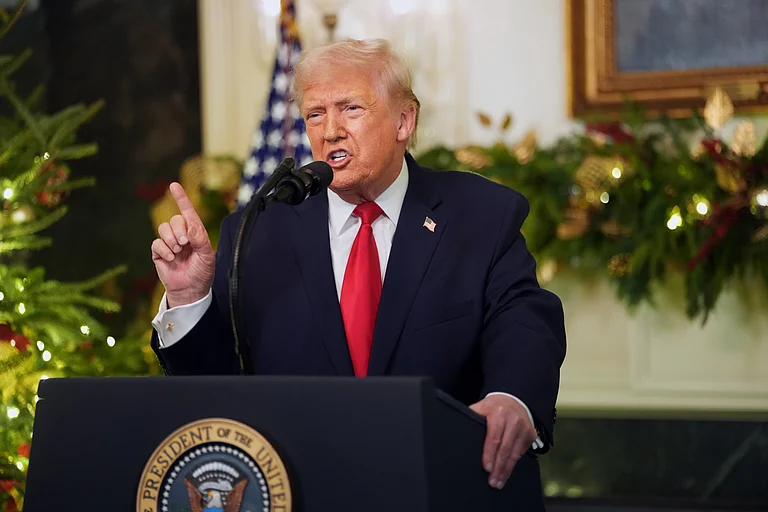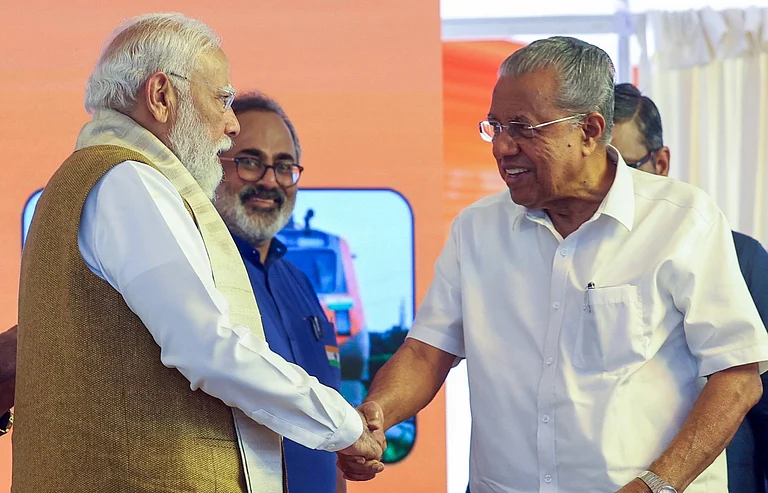This article was published in the Outlook magazine issue 'Altered Federalism' dated February 28, 2022. To read more article from the issue, click here.
India, that is Bharat, shall be a union of states. Federalism underpins the basic structure of the Indian Constitution. By prising open spaces for negotiation and accommodation of India’s ethic, regional and linguistic diversity, it is this federal principle that has enabled the modern Indian nation state to cohere. Today, as tensions in Centre-state relations have heightened, India’s federal compact appears at a crossroads. New sites of contestation have emerged amid increasing political centralisation. At the same time, social and economic transitions of the last 30 years have shifted the dynamic of intergovernmental relationships, creating new distributional pressures over resources. Can India negotiate a new federal bargain, or will the political lure of centralisation trump federal principles that grounded the Constitution?
Written against the backdrop of Partition, India’s Constitution adopted a unique brand of federalism that sought to respond to the twin imperatives of nation building and democratic consolidation that placed relatively weak checks and balances on the powers of the Union government. A strong Centre can, for instance, redraw state boundaries. This strong centre coexisted with the recognition that India’s diversity of language, region and religion could only be preserved through federal accommodation. Thus the constitution allowed for other unique political arrangements that offer varying degrees of autonomy (what political scientists have termed asymmetric federalism) to accommodate specific religious, regional and ethnic identity claims. This is why federalism in India is so closely intertwined with its project of democratic consolidation. The Constitution also crafted a framework for intergovernmental power sharing that has locked the Centre and the states in a relationship of administrative and fiscal interdependence. The Union government has overwhelming revenue powers, while state governments bear the bulk of expenditure responsibilities. In this sense, states are dependent on the Union to fulfil their constitutionally-assigned responsibilities, and the Centre, in turn, is dependent on the states to pursue national goals.
This model of federalism, with a strong Union and intergovernmental dependence, served India well, despite routine misuse of its powers by the Union. It enabled democratic consolidation by empowering the Union government to accommodate India’s linguistic and ethnic diversity, most notable in the linguistic compromise struck through the States Reorganisation Act. But it also meant that changes in India’s political dynamics play a significant role in shaping how the Union government chooses to deploy its powers and in so doing, shape the contours of Centre-state relations.

Commencement and Repeals Artwork by Riyas Komu
The promise of a deepening federal compact came to life in the 1990s, when the regionalisation of India’s politics created new sites of political competition, and regional political parties began to dominate national politics. As Yogendra Yadav and Suhas Palshikar have pointed out, the Indian voter began to vote for the Lok Sabha as if they were electing their chief minister. This phase of political regionalisation was accompanied by fundamental shifts in the economy, when in 1991, India abandoned centralised planning and industrial policy, thereby shifting the locus of economic activity to the states. The states thus took on an increasingly visible role in India’s political and economic life, best illustrated in the phrase “federalism without the Centre”—a slogan coined at a chief ministers’ conference in Hyderabad in 1996.
Somewhat paradoxically, even as conditions of a fuller federal compact were ripe, political regionalisation created an opportunity for chief ministers to aggregate power within their offices and run their states in a centralised, personality driven manner. Herein lay the contradiction. Even as politics became more decentralised, the inner workings of political parties became more centralised, resulting in a political and administrative culture that championed centralization, leaving few takers for the project of reshaping India’s federal bargain. Rather than mobilise to rebalance the Centre-state interdependencies, regional parties leveraged the inherent centralisation in fiscal and administrative powers to their political advantage. As political scientist Lousie Tilin has shown, in this phase chief ministers’ deftly claimed electoral credit when central schemes were implemented well, blaming the Centre when implementation was uneven! Thus, the federal balance was maintained. Equally, governments at the Centre, deployed their fiscal powers to launch central schemes and spend money to gain political visibility in states by encroaching on expenditure powers constitutionally vested to States. As coalition governments flourished, so did the Union’s footprint vis-a-vis constitutionally assigned state subjects. To illustrate: Between 2005 and 2012, Union government spending on state subjects rose from 14 to 20 per cent, and its spending on concurrent subjects rose from 13 to 17 per cent.
The emergence of BJP as a single party majority in 2014 has fundamentally changed that federal bargain, both because it has put a pause to the increased presence of regional parties in national politics, but also because the BJP’s penchant for centralisation has opened new sites of contestation in India’s federal bargain. Thus, federalism today is both more vulnerable and unexpectedly more resilient.
Ideologically, the BJP has little patience with federalism as a device for political accommodation. Instead, it has couched its discomfiture with federalism by deploying the vocabulary of development and nationalism. To accelerate progress, India must become ‘one nation, one market’, ‘one nation, one ration card’, ‘one nation, one tax’, etc. Federalism as an idea is being positioned in tension with development and progress. The ‘one nation’ project is now deployed to legitimise blatant acts of centralisation, from the use of emergency powers to impose President’s Rule, deployment of central investigative agencies in states, and perhaps most egregiously, the abrogation of Article 370 and the amendment to the Government of National Capital Territory of Delhi (NCT) Act, which directly strip elected governments of their powers.
At the same time, in the name of cooperative federalism, fundamental shifts have taken place in the administrative and fiscal landscape. These include the dismantling of the Planning Commission and creation of the NITI Aayog, commitment to enhancing fiscal devolution to states made in the 14th Finance Commission, and the adoption of the Goods and Services Tax (GST) with the establishment of the GST Council. In principle, these reforms held the promise of deeper federalism, but in practice, have become instruments of re-centralisation. The Centre has continued to squeeze revenue from states and to centralise finances by imposing cess and surcharges (special purpose taxes that are not shareable with States like the agriculture and infrastructure cess) that in turn reduce the state share of gross tax revenue collected, insisting on giving GST compensation to states as loans (after long delays) and increasing the share of states in central schemes. The pandemic-induced economic crisis has only exaggerated this. Arguably, India’s federal architecture is far more centralised today than it was in 2014, despite the promise of cooperative federalism.
ALSO READ: Federalism And The Idea Of Regionalism
Finally, the re-establishment of the BJP as a dominant party has substantially reduced the bargaining position of state parties on the national stage. The combination of technology and deft welfare politics has enabled the BJP to pursue its ‘one nation’ project by shifting credit-claiming for governance and welfare away from state chief ministers toward the Union government, and, more specifically, toward the PM himself. In doing so, the federal bargain of the 1990-2014 era has been fundamentally upended.
But this has also opened new sites of federal contestation. As I have argued in another essay with Neelanjan Sircar, political centralisation has resulted in greater distinctions between regional and national politics. Voters are increasingly making different choices in state and national elections. The result is that state elections are far more competitive in 2022 than they were in the early years after 2014. And states that can afford to are jumping into the arena to launch their own welfare schemes, in some instances replacing Union government programmes. This new political contestation is a sign that federalism is partially alive. And it has the potential to re-emerge as a site of political mobilisation. The proposal by the chief ministers of West Bengal and Tamil Nadu to hold a non-BJP chief ministers’ convention is testimony to the ensuring resilience of the federal principle. But reclaiming the federal principle and building a politics of federalism will require far more than short-sighted electoral politics. Looking ahead, India’s federalism is likely to encounter even greater challenges.
First, the growing divergence in growth trajectories across the states will impose new distributive pressures on federalism, as richer states will increasingly have to share the burden with poorer states. Crucially, this divergence will result in greater internal migration (as was visible during the pandemic-induced lockdown in early 2020). In the next decade, this combination of increased migration and spatial divergence will likely give rise to new distributive conflicts over financing public services and control over local resources and jobs. One early illustration of this challenge relates to the current post-Covid economic recovery plans in states, with many state governments announcing job quotas for local residents, including in the private sector. This is perhaps the first time that state governments have taken such an overtly parochial stand on economic matters.
Second, political delimitation. In 2026, India will need to restructure the current allocation of seats, taking the latest population census as base. This will lead to a change in the mix of legislators between the southern and northern states. Negotiating these tensions will need political maturity, patience and an ability to forge a new federal consensus.
The future of India’s federalism rests on how these contradictions are negotiated. For the moment, India’s dangerous political penchant for centralisation suggests that today, the federalism that framers of India’s Constitution saw as necessary to its democracy, has far fewer takers than in 1947—a dangerous portend for India’s democracy.
(Views expressed are personal)
ALSO READ
Yamini Aiyar is the president and CEO of Centre for Policy Research, Delhi






















